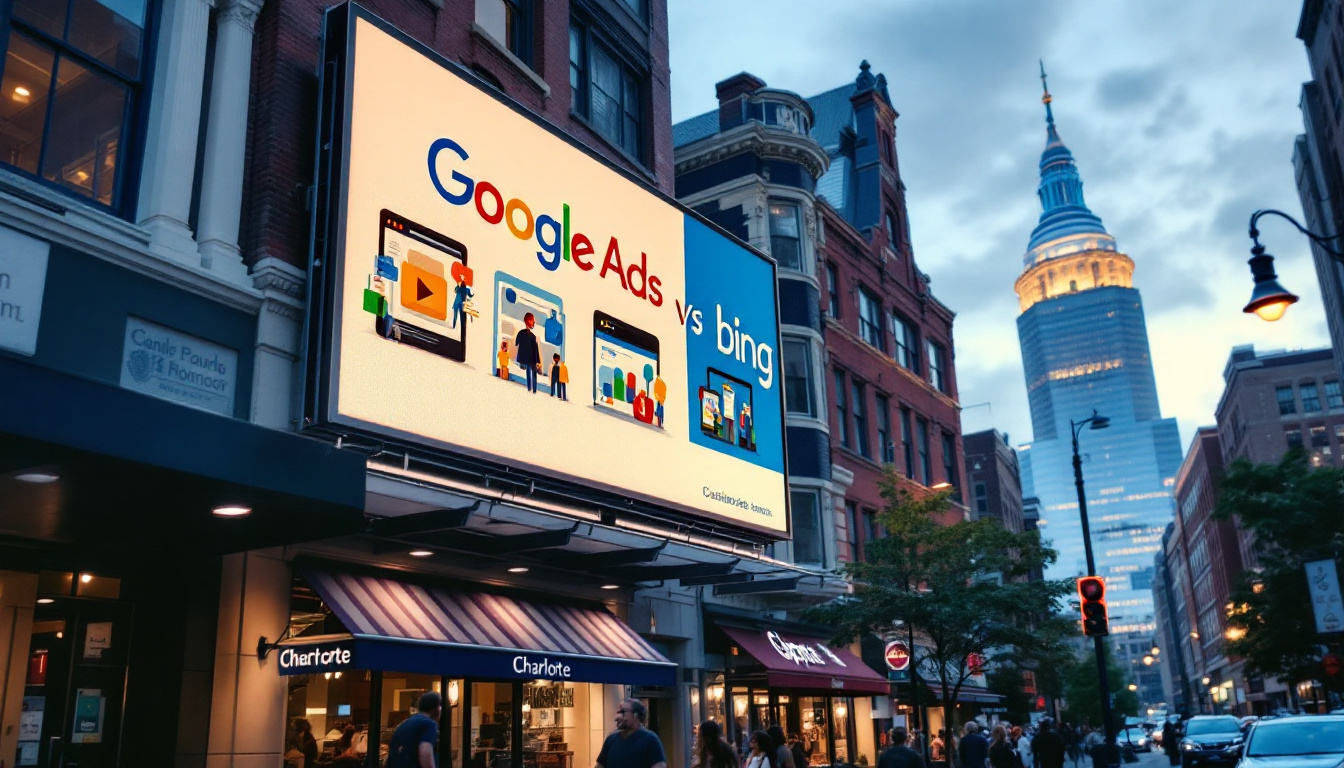5 PPC Metrics Every Charlotte, NC Business Owner Should Watch

Pay-per-click (PPC) advertising has become an invaluable tool for businesses aiming to increase their online presence and drive targeted traffic to their websites. For owners of businesses in Charlotte, NC, understanding the essential metrics that influence PPC performance can be a game changer. This article will explore the five most important PPC metrics that every business owner should keep an eye on to optimize their campaigns and maximize ROI.
Understanding the importance of CTR
The Click-Through Rate (CTR) is one of the most vital metrics in PPC marketing. It measures the percentage of users who click on your ad after seeing it. A higher CTR indicates that your ad is relevant and appealing to your target audience, which directly impacts your Quality Score and costs in PPC campaigns.

For Charlotte businesses, improving CTR means capturing the attention of local consumers effectively. This metric not only reflects your ad's performance but also serves as an indicator of how well your keywords are aligned with user intent. A low CTR can signal that your ads may need refinement, including changes to headlines, descriptions, or targeted keywords. Understanding the nuances of your audience's preferences can lead to more tailored ads that resonate with potential customers, ultimately driving better engagement and conversion rates.
Factors Affecting CTR
Several factors can influence your CTR, including:
- Ad Copy Quality: Compelling and relevant ad copy is essential for attracting clicks. Test different variations to see which resonates best.
- Targeting: Properly targeting demographics and locations can ensure your ads reach the right audience.
- Ad Position: Ads in higher positions tend to have better CTR. Monitor your ad placements regularly.
Improving Your CTR
To boost your CTR, consider implementing A/B testing strategies and adjusting your keywords. Additionally, incorporating calls-to-action that entice users to click can significantly affect your CTR. Keeping your ads both relevant and engaging is key to ensuring they stand out. Furthermore, leveraging ad extensions can enhance your ads' visibility and provide additional information, such as location, phone numbers, or links to specific pages on your website, which can further entice users to click through.
Another effective strategy for improving CTR is to analyze your competitors' ads. By examining what works for them—be it their ad copy, visuals, or targeting strategies—you can gain valuable insights that inform your own campaigns. Additionally, staying updated with industry trends and consumer behavior can help you adapt your ads to meet changing preferences, ensuring that your messaging remains fresh and relevant in a competitive landscape.
How to calculate ROI for your PPC campaigns
Understanding the return on investment (ROI) for your PPC campaigns is essential in determining their effectiveness. ROI helps business owners assess whether their advertising spend is producing a profitable return. The calculation typically follows the formula:
ROI = (Net Profit / Cost of Investment) x 100
For Charlotte businesses, calculating ROI includes considering various factors such as total ad spend, total revenue generated from the campaign, and any other costs associated with your PPC efforts. This comprehensive approach will help owners make informed decisions about where to allocate their advertising budget. Additionally, it is important to factor in the lifetime value of customers acquired through these campaigns, as this can significantly impact the overall profitability of your marketing efforts. By understanding not just the immediate returns, but also the long-term value of new customers, businesses can better strategize their PPC investments.
Importance of Tracking Revenue
Tracking revenue generated from PPC campaigns involves setting up conversion tracking through tools like Google Ads or Google Analytics. This will allow you to accurately attribute sales and leads to specific campaigns, keywords, or ads. By doing this, you can determine which strategies yield the highest returns and adjust your budget allocation accordingly. Moreover, integrating customer relationship management (CRM) systems with your PPC data can provide deeper insights into customer behavior and preferences, enabling you to refine your targeting and messaging. This holistic view of customer interactions not only aids in optimizing PPC campaigns but also enhances overall marketing strategies.
Adjusting Campaigns Based on ROI
Once you have calculated your ROI, you may find that some campaigns are underperforming. You can choose to pause these campaigns, allocate more budget to high-performing ads, or even experiment with different strategies to optimize your results. This ongoing analysis ensures your advertising efforts are both cost-effective and profitable. Furthermore, consider conducting A/B testing on various ad elements, such as headlines, images, and calls to action, to identify what resonates best with your audience. By continuously refining your approach based on data-driven insights, you can enhance your PPC performance and achieve a more favorable ROI over time. Engaging with your audience through retargeting campaigns can also help recapture potential customers who showed initial interest but did not convert, ultimately leading to improved returns on your advertising spend.
The role of Quality Score in PPC success
Quality Score is a crucial metric used by platforms like Google Ads to evaluate the quality and relevance of your ads, keywords, and landing pages. This score, which ranges from 1 to 10, can significantly impact your ad placements and costs per click. A higher Quality Score leads to better ad positions at lower costs, making it a vital focus for Charlotte business owners.
Improving your Quality Score involves focusing on three main components: ad relevance, landing page experience, and expected CTR. Each of these elements plays a significant role in ensuring that your PPC campaigns are successful.
Improving Ad Relevance
Your ads should closely match the keywords you are targeting. This means ensuring that the keywords in your ad group align with the ad copy you create. Testing different versions of keywords and ad copies can help identify what works best for your audience. Additionally, utilizing dynamic keyword insertion can enhance ad relevance by automatically updating your ad text to include the search terms users are entering. This not only captures attention but also increases the likelihood of clicks, as users see their search terms reflected in your ads.
Ensure a Positive Landing Page Experience
A well-optimized landing page that provides a seamless user experience can dramatically improve your Quality Score. This includes fast load times, mobile optimization, and relevant content that fulfills the promise made in the ad. A good user experience encourages conversions and signals to search engines that your ad is valuable. Furthermore, incorporating clear calls-to-action and easy navigation can guide users toward their next steps, whether that’s making a purchase, signing up for a newsletter, or contacting your business. Ensuring that your landing page is visually appealing and informative can also enhance user engagement, reducing bounce rates and boosting your Quality Score even further.
Moreover, regularly analyzing user behavior on your landing pages through tools like Google Analytics can provide insights into what elements are working and what may need adjustment. Understanding metrics such as average session duration and pages per session can help you refine your content and layout to better meet the needs of your visitors. By continually optimizing both your ads and landing pages, you can create a cycle of improvement that not only enhances your Quality Score but also drives better overall performance in your PPC campaigns.
Why impression share matters in competitive markets
Impression share refers to the percentage of total impressions your ads receive compared to the total number of impressions they could potentially receive within the specified target market. In competitive markets like Charlotte, it is crucial to monitor this metric to gauge how your ads stack up against the competition.
Low impression share may indicate that competitors are outbidding you for valuable ad placements. Keeping track of impression share will help business owners identify when to increase their bids or refine their targeting strategies.
Strategies to Improve Impression Share
To enhance your impression share, consider the following strategies:
- Increase Bids: If your budget allows, increasing your bids can help secure more impressions.
- Expand Targeting: Broaden your audience reach to include more keywords or locations.
- Optimize Ad Scheduling: Running ads during peak hours can enhance visibility and interaction.
How to track keyword performance effectively
Monitoring keyword performance is critical to understanding which search terms are driving the most relevant traffic to your website. Charlotte business owners should utilize tools like Google Ads reports and analytics platforms to measure keyword effectiveness continuously.

Key metrics to track include clicks, impressions, CTR, conversion rates, and average CPC. By analyzing these metrics, business owners can make informed decisions on which keywords to maintain, pause, or enhance within their PPC campaigns.
Using Keyword Performance to Influence Strategy
Insights gained from keyword performance tracking can shape your overall PPC strategy. For example, if certain keywords are generating high conversion rates, consider increasing your budget for those keywords or creating additional targeted ads. Conversely, keywords with high spend but low returns should be reevaluated or removed from your strategy.
In conclusion, understanding and monitoring these five key PPC metrics allows Charlotte business owners to navigate the complex world of online advertising more effectively. By focusing on CTR, ROI, Quality Score, impression share, and keyword performance, businesses can create more optimized campaigns that yield higher returns and greater success in attracting local customers.

As a Google Ads expert, I bring proven expertise in optimizing advertising campaigns to maximize ROI.
I specialize in sharing advanced strategies and targeted tips to refine Google Ads campaign management.
Committed to staying ahead of the latest trends and algorithms, I ensure that my clients receive cutting-edge solutions.
My passion for digital marketing and my ability to interpret data for strategic insights enable me to offer high-level consulting that aims to exceed expectations.




























